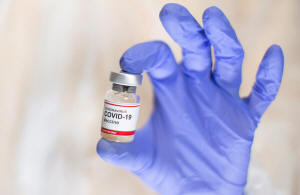Brazil variant can reinfect virus survivors; COVID-19 vaccine antibodies
pass into breast milk
 Send a link to a friend
Send a link to a friend
 [March 11, 2021]
By Nancy Lapid [March 11, 2021]
By Nancy Lapid
(Reuters) - The following is a roundup of
some of the latest scientific studies on the novel coronavirus and
efforts to find treatments and vaccines for COVID-19, the illness caused
by the virus.
Variant in Brazil more likely to reinfect survivors
A coronavirus variant circulating in Brazil is likely able to reinfect
people who survived infections with earlier versions of the coronavirus,
new data suggest. The variant that emerged in Brazil, called P.1,
carries a mutation that is already known to make a variant prevalent in
South Africa harder to treat with antibodies and harder to prevent with
available vaccines. New data suggest that in many recovered patients,
immunity to earlier versions of the virus will not afford immunity to
P.1. Researchers tested the neutralizing ability of antibodies in plasma
samples taken from survivors of COVID-19 caused by earlier versions of
the virus. The plasma "had 6-fold less neutralizing capacity" against
the P.1 variant than against earlier virus versions, the researchers
reported on Monday ahead of peer-review on a preprint server belonging
to The Lancet journal. "Lower neutralization capacity of SARS-CoV-2
antibodies and partial immunity against new variants suggests that
reinfection could occur in convalescent or even vaccinated individuals,"
the authors said. In a separate paper posted on Wednesday on medRxiv
ahead of peer review, some of the same researchers estimated that among
every 100 survivors of COVID-19 due to earlier virus versions, 25-to-60
could become reinfected if exposed to the P.1 variant because their
antibodies could not protect them. As of Thursday, according to the U.S.
Centers for Disease Control of Prevention, there have been 13 cases of
COVID-19 due to P.1 in the United States.


[to top of second column]
|

A woman holds a small bottle labelled with a "Coronavirus COVID-19
Vaccine" sticker in this illustration taken, October 30, 2020.
REUTERS/Dado Ruvic/File Photo

COVID-19 vaccine antibodies pass into breast milk
COVID-19 antibodies induced by vaccines from Pfizer Inc/BioNTech and
Moderna Inc can pass into breast milk, a small study suggests,
although it is not clear yet how long the antibodies will be
present. Six breastfeeding mothers who planned to receive both doses
of the Pfizer/BioNTech or Moderna vaccines provided researchers with
milk samples before and after vaccination, with the last sample
collected two weeks after the second shot. None of the women had
been infected with the coronavirus. A week after the first shot, all
of the women had COVID-19 antibodies in their breast milk. Antibody
levels fell slightly afterward and then sharply increased after the
second shot. The two vaccines were similarly effective in inducing
the antibodies, although antibody levels varied from woman to woman,
the research team reported on Tuesday on medRxiv ahead of peer
review. "Further research is needed on the longevity of the antibody
response in breast milk, as well as the magnitude and duration of
effect on infant immunity to the virus," the researchers said.
Neurologic issues common in hospitalized children with COVID-19
Most children and adolescents are spared from severe COVID-19, but
among those who do require hospitalization, temporary neurologic
effects are common, researchers found. In their study of 1,695
patients age 21 or younger hospitalized for COVID-19 or a
COVID-19-related illness known as multisystem inflammatory syndrome,
365 – or 22% - had neurologic complications, including 43 (12%) with
life-threatening neurologic disorders such as strokes and central
nervous system infections. Other neurologic effects included
seizures, headache, weakness, loss of smell and taste, and altered
awareness or confusion. Neurologic involvement in most patients was
transient and resolved by the time they left the hospital, according
to a report published on Friday in JAMA Neurology. Because they only
studied hospitalized children, the range and rate of neurologic
complications may be an underestimate of the actual issue, the
authors said. They said more research is needed both to determine
the true incidence and to track these children over the long term.
(Reporting by Nancy Lapid; Editing by Bill Berkrot)
[© 2021 Thomson Reuters. All rights
reserved.] Copyright 2021 Reuters. All rights reserved. This material may not be published,
broadcast, rewritten or redistributed.
Thompson Reuters is solely responsible for this content. |